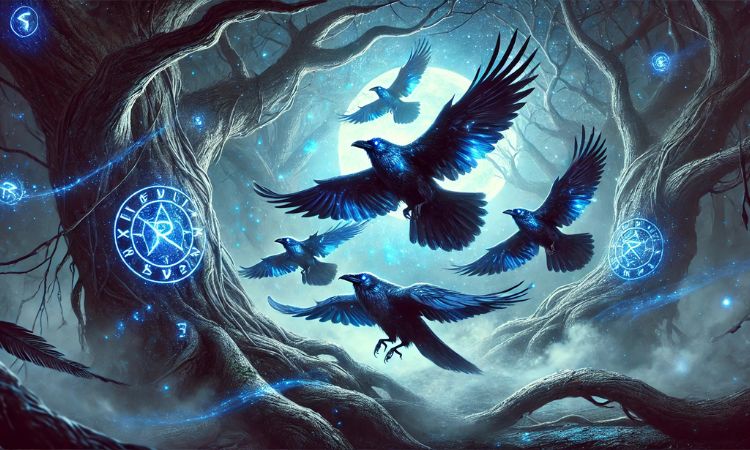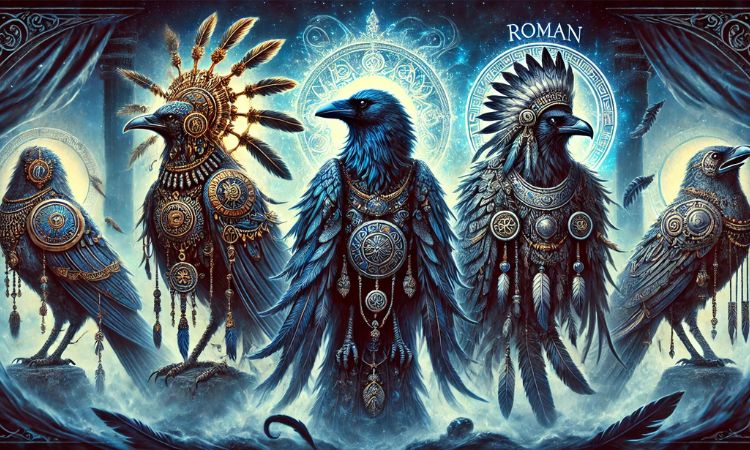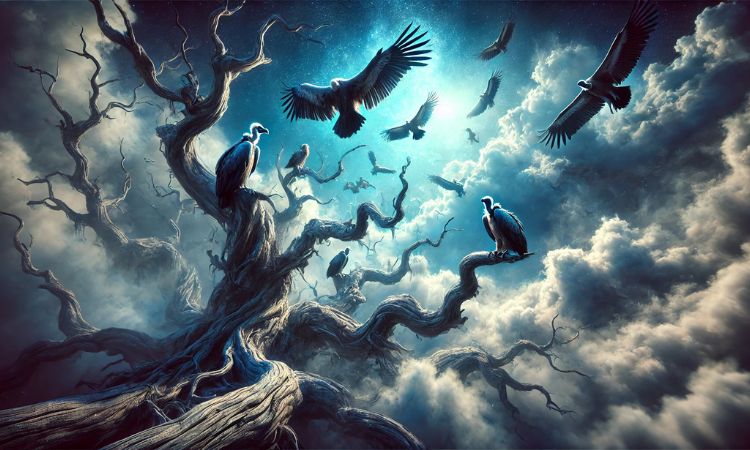Crows have long stirred curiosity, especially when seen in biblical contexts. You might have wondered what these birds represent in Scripture and why their presence often feels significant. The symbolism of crows can leave some puzzled, especially with the associations many cultures tie to these dark birds.
One fact stands out: in the Bible, both crows and ravens appear, often carrying messages or pointing toward deeper truths. This might lead to questions about their true meaning and whether seeing a crow today holds any spiritual insight.
In this exploration, we’ll uncover the meaning behind these birds, addressing what crows symbolize in biblical passages and what lessons they may bring. If you’ve ever sought to understand the deeper significance of seeing a crow, you’re in the right place. We’ll clarify the spiritual meaning they carry and what that might mean for your own journey.

Key Takeaways
- Crows in the Bible symbolize divine provision, as seen when God uses them to provide for Elijah during a famine.
- Their presence signifies wisdom and personal reflection, reminding individuals to reflect on their spiritual journey and growth.
- Crows represent judgment and warning, urging people to remain faithful and heed God’s instructions in their lives.
- In some biblical contexts, crows are linked to transformation and rebirth, emphasizing personal growth and spiritual readiness.
What Is the Biblical Meaning of Black Crows?
Divine Provision
In the Bible, crows appear as symbols of provision and care. The story of Elijah being fed by crows during a famine serves as a prime example.
God sends crows to bring food to the prophet, demonstrating His ability to provide even in desperate situations. This narrative highlights how crows serve as messengers of sustenance, pointing to God’s care for those in need.
Wisdom and Reflection
Crows are often seen as intelligent creatures, known for their problem-solving skills. In biblical symbolism, they represent wisdom and encourage reflection.
Their solitary nature invites introspection, making them a reminder of the importance of examining one’s own spiritual path. This highlights the value of personal growth and discernment in one’s journey.
Judgment and Warning
Crows also symbolize judgment. In some biblical narratives, their presence signifies impending consequences for disobedience. They often serve as a reminder to heed God’s warnings and act in accordance with His will, reflecting the need for repentance and moral integrity.
Death and Mourning
Crows are sometimes associated with death in biblical contexts, often linked to their dark feathers. Their appearance can signify mourning or the inevitability of mortality. While this association may seem grim, it also brings awareness to life’s transient nature and the importance of spiritual readiness.
Spiritual Warfare
In some interpretations, crows represent the battle between good and evil. Their presence in certain texts signifies the challenges believers face in spiritual warfare. Crows symbolize the need for vigilance and perseverance in overcoming temptations and staying true to one’s faith.
Transformation and Rebirth
Crows can also symbolize transformation. Their ability to adapt to various environments is viewed as a metaphor for change and rebirth. This perspective suggests that crows bring a message of personal growth, encouraging individuals to embrace transformation in their spiritual lives.
What Is the Spiritual Significance of Crows in Different Cultures?

The spiritual significance of crows varies widely across cultures. In Norse mythology, crows are associated with Odin, the god of wisdom and war. His two crows, Huginn and Muninn, serve as messengers between the human and divine realms, symbolizing wisdom and memory. In this context, crows symbolize the connection between thought and knowledge.
In Hinduism, crows play a significant role as intermediaries between the living and the deceased. They are believed to carry offerings to ancestors, reminding people of their spiritual duty to honor those who have passed. Feeding crows is seen as an act of respect and spiritual balance.
Native American cultures often regard crows as messengers from the spirit world. They symbolize transformation, and intelligence, and are sometimes viewed as tricksters. Crows serve as protectors, guarding against evil and encouraging personal growth.
In Celtic mythology, crows are linked to the goddess Morrigan, embodying themes of war, fate, and transformation. They are revered for their strategic intelligence and shapeshifting abilities, signifying change and adaptability.
In Greek and Roman mythology, crows are symbols of prophecy and divination. The Greeks associated them with Apollo, while the Romans used them for augury, believing their flight patterns revealed divine guidance.
Asian cultures also hold crows in high regard. In China, they symbolize wealth and prosperity, while in Japan, crows are seen as divine messengers, representing transformation and rebirth. Ancient Egyptians believed crows guided souls to the afterlife, viewing them as symbols of the soul itself.
Across these cultures, crows hold a pivotal role in spiritual symbolism, reflecting diverse aspects of life, transformation, and the divine.
What Are the Verses Related to Crows in the Bible?
Several Bible verses mention crows and ravens, often symbolizing God’s provision and care. Here are some key passages related to these birds:
- Genesis 8:7: After the flood, Noah released a raven to see if the waters had receded. The raven flew back and forth until the waters dried. This verse emphasizes the raven’s role in the story of Noah’s Ark, symbolizing endurance and exploration in times of uncertainty.
- 1 Kings 17:4-6: God instructed ravens to bring food to Elijah during a severe drought. The ravens provided bread and meat for him in the morning and evening as he stayed by the brook Cherith. This passage highlights how crows symbolize divine provision, reminding us of God’s care during times of hardship.
- Job 38:41: God asks, “Who provides food for the raven when its young cry out to God and wander about for lack of food?” Here, the raven symbolizes God’s watchful care over all creatures, including those often seen as insignificant.
- Psalm 147:9: “He provides food for the cattle and for the young ravens when they call.” This verse reiterates that even the ravens, often overlooked, are sustained by God’s provision.
- Luke 12:24: Jesus says, “Consider the ravens: They do not sow or reap, they have no storeroom or barn; yet God feeds them. And how much more valuable you are than birds!” In this teaching, the crow holds spiritual meaning, symbolizing trust in God’s provision and care for all life.
These verses illustrate that, in biblical contexts, crows and ravens serve as powerful reminders of God’s care and provision.
What Lessons Can We Learn From Crows in the Bible?

One key lesson crows offer in the Bible is divine provision. In 1 Kings 17:4-6, ravens brought food to Elijah during a drought, showing how God can provide for His people through unexpected means. This story reminds us that even in challenging times, provision can come from unexpected sources. Crows symbolize reliance on God’s care, as mentioned in Luke 12:24, where Jesus points out that these birds are sustained despite their lack of preparation, teaching us to trust in God’s timing.
Crows and ravens also serve as messengers in biblical narratives, often signifying divine wisdom. Their role in delivering food to Elijah or representing divine care underscores the importance of seeking wisdom from higher sources. This symbolism encourages us to be open to divine guidance and understand that wisdom can come in many forms.
Lastly, these birds remind us of life’s challenges and how we can overcome adversity. In various passages, their presence suggests that even in times of hardship, there is always a path to overcoming difficulties. Crows and ravens hold a pivotal place in reminding us of the deeper spiritual truths in the Bible.
FAQs
What Does It Mean if a Crow Visits You?
When a crow visits, it often signals transformation, wisdom, or a significant change in your life. Many cultures view crows as messengers from the spiritual realm, suggesting you pay attention to hidden insights or upcoming revelations, offering a chance for personal growth.
Are Black Crows Good Omens?
The meaning of black crows varies culturally. While some see them as omens of death or misfortune, others associate them with intelligence, transformation, and protection. In Native American and Celtic traditions, for instance, they symbolize wisdom, change, and rebirth, presenting a more positive interpretation.
Which God Represents the Crow?
Several gods are linked to crows, including Morrigan in Celtic mythology (goddess of war and fate), Odin in Norse mythology (god of wisdom, with two ravens as messengers), Apollo in Greek mythology (god of prophecy), and Shani in Hinduism (associated with crows and Saturn).
Should Seeing a Black Crow Be Considered a Spiritual Sign?
Yes, many consider a black crow sighting as a spiritual sign, symbolizing transformation and wisdom. Crows often represent the need to embrace change and deeper spiritual truths, urging you to trust your intuition and stay open to the messages the universe or spirit world may be offering.
Conclusion
Crows hold rich symbolism in biblical texts, pointing toward key spiritual themes. They illustrate God’s provision, as seen in the story of Elijah being fed during a drought, emphasizing that sustenance can arrive in unexpected ways. This offers a message of trust in divine care.
Crows also reflect wisdom and introspection, encouraging believers to examine their spiritual path. Their presence as messengers underscores the importance of seeking wisdom from higher sources.
These birds also symbolize transformation, offering hope for personal growth and overcoming challenges. With their diverse roles, crows serve as reminders of spiritual truths, offering lessons on faith, perseverance, and trust in God’s plan.






